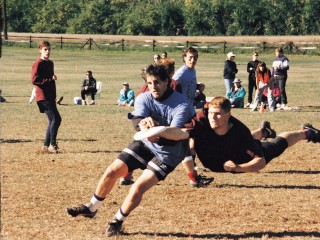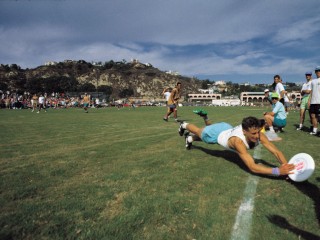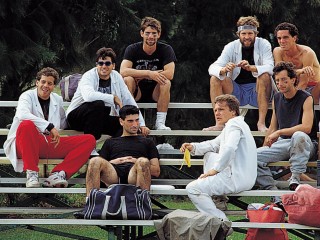At Nationals in 1987, Robert “Nob” Rauch was elected to replace Gary McGivney as the national director of the UPA. Nob, an investment banker by trade and a New Yorker since 1985, had an immediate impact on the shoestring volunteer organization that was the UPA.
“The UPA at that time was a virtual entity, it didn’t exist,” said Rauch. “I got shipped a box, some stationery and a few things, such as business cards. The UPA had only been held together since the early 1980s by the efforts of Carney Foy, the treasurer, and his wife, Creta, in Silver City, New Mexico.”
Nob had a clear goal of turning the UPA around to be a self-standing corporate entity and he went after this goal with great success. With help from Brian Murphy, legal counsel and former ND, Nob quickly reestablished the UPA’s corporate standing which had lapsed, reinstated the 501(c) not-for-profit status, redrafted bylaws and began work on writing the 9th Edition rules.
Nob’s three-year administration, by his own account, was pragmatic. There was a shortage of money to support the goals the UPA needed to accomplish, so Nob polled the players to see if a raise in membership dues was acceptable. The players agreed and the funds went to pay for group field liability insurance, the toll-free number, continued support of large tournaments like Nationals and the grassroots development of summer leagues.
“Nob prepared—by himself—100-page, briefing books that he sent out to the board ahead of time. He asked us to set goals and to define a vision and he had a business plan. In the immediate years prior to Nob, everything was ad hoc, reactive and done in our spare time,” credited board member Sholom (Eric) Simon. “Suddenly, we took ourselves as a business entity quite seriously.”
“I’m a believer that while many issues are gray, decisions that are made institutionally need to be considered black and white if they are to be implemented throughout a large, diverse organization consistently over time,” said Nob recently.
Another well-known New Yorker, Kathy Pufahl, was kept on at the UPA from her previous position as women’s national director. She was promoted to be the managing director. Her countless hours of work and dedication to the daily management of the UPA made it an organization that was suddenly moving with speed and purpose.
“My primary goal was to do what I could to ensure that Ultimate survived by growing,” said Rauch. “With all of the possible activities for people to pursue, my fear was that stagnation would mean death.”
Some of Nob’s toughest challenges remain with us today. His first major issue regarding the UPA had roots in the teams that Nob had played for: Windy City and New York. The near-constant debate over referees, observers and the Spirit of the Game came up with a vengeance during Nob’s watch. As a response, in 1990 Nob launched the Certified Observer Pool (COP) to qualify observers to make sure that the elite-level Nationals players could cope with them during games.
The observer issue was finally worked out in the late 1990s, but Nob’s larger interest at the time in the promotion, marketing and sponsorship of Ultimate has yet to be worked out. Some of Nob’s stated goals were to get ultimate into the Pan Am Games by 1997, the Olympics by 2008 and to find sponsorship for Nationals right away. All of these tasks proved difficult.
“The most frustrating aspect of the job came in the area of media and sponsorship. It took me two years to figure out just how the sports business in the US is run, and it only came about after making five or six sponsorship pitches; watching a US Olympic Committee congress; meeting with several other sports’ governing bodies (such as volleyball, triathlon and rugby); and meeting with a couple of big league sports marketing firms,” Rauch said in a 1999 interview for the Newsletter.
“My conclusion was that media attention only comes with money, which is the primary source of credibility for inclusion on the sports page or television; and sponsorship will only be given to events that ‘sell.’ Any sponsor has fairly rigid ideas of what they want an event they are considering to look like. They will virtually always insist on control over the event in an attempt to make it ‘better.’” It was this knowledge gained by Nob that helped turn the UPA off to the entreaties of Cuervo sponsorship.
Nob and Murphy were also keen on establishing a board of directors for the UPA that would replace the coordinating committee and help to stabilize the small organization. Today’s UPA is still fundamentally structured after changes made, and envisioned, during Nob’s time. His dedication to running a smart, cohesive and well-structured organization served ultimate for years to come.








Comments Policy: At Skyd, we value all legitimate contributions to the discussion of ultimate. However, please ensure your input is respectful. Hateful, slanderous, or disrespectful comments will be deleted. For grammatical, factual, and typographic errors, instead of leaving a comment, please e-mail our editors directly at editors [at] skydmagazine.com.